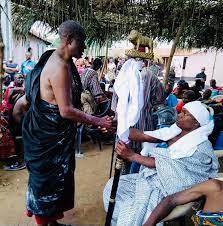Ave-Traditional Area: A Mix of Ewe and Asante Cultures with Great Development
Every Easter, thousands of their relatives get back home in convoys from all walks of life, especially Takoradi and Asamankese. Their easter gala is one to watch. The communal spirit and hospitality is just like that of Asantes.
- Advertisement -
A lot of people are of the notion that Ewes and Asantes do not get along. That is not true. All that is necessary to keep a union going is respect – you respect the other person’s opinions, culture and more. A lot of Ewes feel so comfortable with Asantes than their own tribesmen.
In the Akatsi North Municipality of the Volta Region lies the people of Ave Traditional Area. Just like any other people, they have a way of life. Getting to the community, the first thing you realize is a people who speak both Ewe and Twi – you will be greeted in both. As you enter into their towns, you will begin to hear the sounds of the pounding of fufu. Looking at the soup, which contains kontomire; snail; mushroom and vital leaves, you will rethink where exactly you are – Eweland or Asanteland.
- Advertisement -
The cultural heritage is almost similar. The people of Ave celebrate their Akwasidae two weeks to that of the Asantes. Yes, I mean the famous Akwasidae traditional festival. Just as Asantes have a very rich culture, the people of Ave also do. Their procession to the famous AMESHIKPE is a once in a lifetime experience – a complete beauty. The ceremony is performed for virgins, traditional stool carriers must also be virgins, and former ‘initiates’ can also join. If you are able to go through the process, you will have full spiritual protection and prosperity. In light of that, the people are just as prosperous as their Asante brothers and sisters. Any outsider is accepted for prayers anytime.
- Advertisement -
When it comes to Agriculture, their lands are just as fertile as Asante lands. They grow maize and cassava mainly. Cocoyam, Plantain, Sweet potato, Tomatoes, Pepper and more are also their seasonal crops. Farm produce is cheapest among the Aves than any other people in the Southeast Volta. Anlos have taken good advantage of that and made good sales of their produce for profits. They had a very nice system of communal farming that makes available cheap labour; and their produce are given out to people in the community especially the elderly and their leaders. If you need raw vegetables with no or little chemical, you can only get it from the Aves and at the cheapest cost.
Every Easter, thousands of their relatives get back home in convoys from all walks of life, especially Takoradi and Asamankese. Their easter gala is one to watch. The communal spirit and hospitality is just like that of Asantes. What I struggled to find out was if their ancestors were Asantes. Now, most Asantes know they have their ‘image/copy’ in the Volta Region, and therefore visit the land of the Aves once in a while.
The people are not without challenges. They suffer from lack of amenities just like most communities. The need for good public toilets, school libraries, roads and more. The road from Ave – Afiedenyigba to Ave Adzigo is in its worst state and affects school activities, farming and general movement of goods and people. Ave Havi, being a border town with potential, also lacks good road from Togo through the border into the town.
- Advertisement -
The level of crime in the area is negligible. That is because of their strong chieftaincy system and also the effort of the assemblymen and other stakeholders like the DCE, TRADITIONAL LEADERS and more. The area is by nature very peaceful and accommodating.
I write this article because it is very rare to have both Asante and Ewe cultures mixed in the most peaceful way. And that in the Volta South, there is a people who could speak Twi as early as six years old. Ave lies not too far from Aflao, Dzodze or Akatsi. The culture of the Asantes have truly travelled and taken root in several communities. If we as a nation could research into that rich culture of the Asantes and assimilate it into other cultures, I believe stronger that the peace in Ghana could last forever. The Asantes should also respect other cultures as well.
My suggestion for the people of Ave is that they teach their children about their rich culture; promote education, trade and farming; develop strong communal bonds and put in concerted efforts towards development. They can, just like any other Ghanaian community, team up with FUND ME GROW, which is a developmental group to help create few employment opportunities for their youth at home.
The great peace and development that is achieved by putting together Asante and Ewe cultures among the Aves is enviable. There is more, I strongly believe, to be achieved.
By Sylvo Ben-Afa
- Advertisement -


